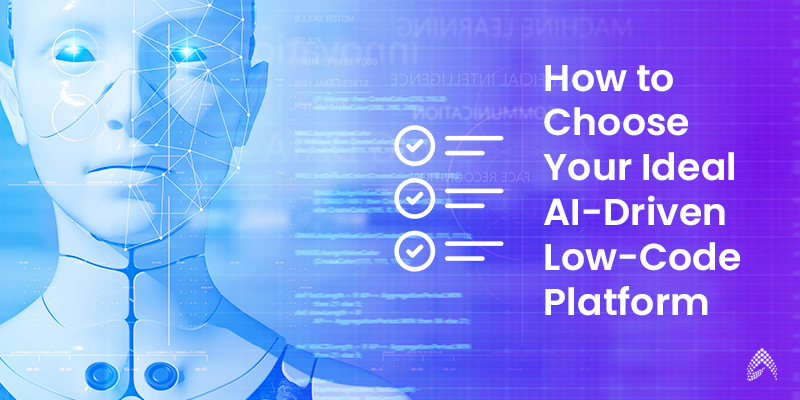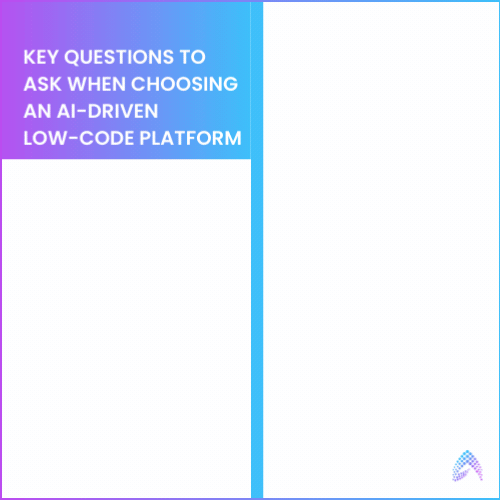How to Select the Right AI Low-Code Platform for Your Business

The race for digital transformation is on, and AI-driven low-code platforms are emerging as the clear front-runners. From automating appointment scheduling, streamlining patient care and insurance claim processing in healthcare to optimizing financial processes, these innovative platforms are revolutionizing how businesses build applications across industries.
Gartner predicts a staggering rise in low-code adoption, with over 70% of new enterprise applications leveraging this technology by 2025. This explosive growth emphasizes the importance of choosing the right platform for your needs. But with a crowded market, navigating this decision can be daunting. So how do you find the perfect fit among the many AI-driven low-code platforms available? In this blog post, we’ll explore key questions to ask before selecting an AI-driven low-code platform, so that you can make an informed decision about the platform that best fits your needs and helps you achieve your goals.
Understanding AI-driven Low-Code Platforms
Low-code platforms have revolutionized application development, providing a visual development approach that minimizes the need for manual coding. In recent years, the integration of artificial intelligence (AI) technology into low-code platforms has taken this revolution to new heights. AI-driven low-code platforms combine the power of AI with the simplicity and speed of low-code development, opening up new possibilities for organizations.
Companies like Mendix and OutSystems are at the forefront with their next-generation AI assistants that go beyond code completion. These assistants can predict developer needs and suggest relevant actions, significantly streamlining the development process.

AI Transforms App Development
Building applications traditionally requires extensive coding, leading to slow development cycles. AI-driven low-code platforms disrupt this by offering a faster, more accessible solution. These platforms combine the user-friendly interface of low-code development (drag-and-drop, pre-built components) with the power of AI. This integration unlocks features like automatic code generation, significantly reducing manual coding and accelerating development. Additionally, AI analyzes data structures, enabling intelligent data mapping, which simplifies integrating diverse data sources into your applications.
Benefits for Businesses
By leveraging AI-powered low-code platforms, businesses gain substantial advantages that extend beyond traditional benefits. Here’s a streamlined view of their impact:
1. Accelerated Application Development: These platforms expedite app development, enabling creation and deployment within days or weeks instead of months, cutting custom development time by 50% to 90% compared to traditional coding, per Forrester.
2. Optimized Resource Allocation: Low-code development reduces resource needs by up to 70%. AI tools automate error checking, suggest best practices, and recommend components, freeing developers for critical tasks.
3. Process Improvement: AI in low-code platforms analyzes data to optimize workflows and identify bottlenecks, enabling data-driven decisions for growth, improving efficiency.
4. Revenue Growth: Integrating low-code in customer-facing applications increases revenue by 58%, enhancing user experiences with personalized features like chatbots and recommendations.
5. Strong ROI: Studies show up to 509% ROI over five years with low-code adoption, underscoring significant cost savings and efficiency gains for every enterprise.
Key Questions to Ask When Choosing an AI-Driven Low-Code Platform

Choosing the right AI-driven low-code platform is crucial for building intelligent applications that empower your business. Here are key questions to ask yourself during the evaluation process, with a deeper focus on AI functionalities:
AI Capabilities: At the heart of any AI-driven low-code platform lie its AI capabilities. These features determine the type of intelligent applications you can build.
- What specific AI functionalities are offered (e.g., pre-built AI models, machine learning, natural language processing)?
- How customizable are these AI features? Can they be tailored to specific application needs?
Scalability and Flexibility: As your business evolves, your application needs will too. The platform should adapt and grow with you.
- Can the platform scale to accommodate future growth in data and users, and integrate with other systems?
- Can the platform integrate with emerging technologies like IoT or blockchain to support future use cases?
AI Model Integration: Leverage your existing AI investments or incorporate specialized functionalities from external sources.
- Can the platform integrate with custom or third-party AI models?
Ease of Use and Learning Resources: Minimize the learning curve for your developers and ensure a smooth development experience.
- Is the platform user-friendly, with drag-and- drop capabilities and visual development tools?
- Does the vendor offer comprehensive learning resources like documentation, tutorials, and training?
Vendor Support and Ecosystem: A strong support system ensures you have the resources to address challenges and keep your development team productive.
- What level of support does the vendor offer?
- Are there technical support channels, forums, and a thriving developer community?
Security and Compliance Features: Protect sensitive data and ensure compliance with relevant regulations.
- Does the platform offer robust security features like data encryption, access controls, and audit trails?
- Does the platform comply with relevant data privacy regulations (e.g., GDPR, CCPA)?
Deployment Options: Choose a deployment model that aligns with your existing infrastructure and security requirements.
- Does the platform offer cloud-based, on-premise, or hybrid deployment options?
Integration with Existing Systems: Break down data silos and ensure a unified data flow across your organization.
- Can the platform integrate with your existing enterprise systems (e.g., CRM, ERP)?
By considering these questions and evaluating potential platforms against these criteria, you’ll be well-equipped to choose an AI-driven low-code platform that empowers your organization to build innovative and successful applications.
Real-Life Example: Boosting Patient Care with AI
Here’s a real-life example of how AI-driven low-code platforms are transforming industries:
A healthcare provider implemented an AI-driven low-code platform in 2023 to streamline patient management. By leveraging the platform’s pre-built AI features, they introduced a virtual health assistant. This assistant not only handles appointments and queries but also uses predictive analytics to personalize patient care plans. This demonstrates how AI-driven low-code platforms can combine user-friendly development with advanced AI functionalities to improve operational efficiency and patient engagement in the healthcare sector.
The Future is Built with AI and Low-Code
The emergence of AI-driven low-code platforms has fundamentally changed application development. These platforms empower organizations to build intelligent applications faster and with less coding expertise, accelerating digital transformation efforts.
Choosing the right platform requires a close evaluation of AI capabilities, scalability, and vendor support. Beyond selection, successful implementation depends on aligning AI functionalities with business goals, establishing clear governance for AI use, including responsible data practices to mitigate bias and ensure privacy, and prioritizing data quality.
Amzur offers expertise to help you navigate the world of AI-driven low-code development. Our team can assist you in finding the ideal platform for your needs. We’ve also created a comprehensive AI-Driven Low-Code Automation Whitepaper that explores the benefits and best practices for implementing these technologies.

Technical Architect




